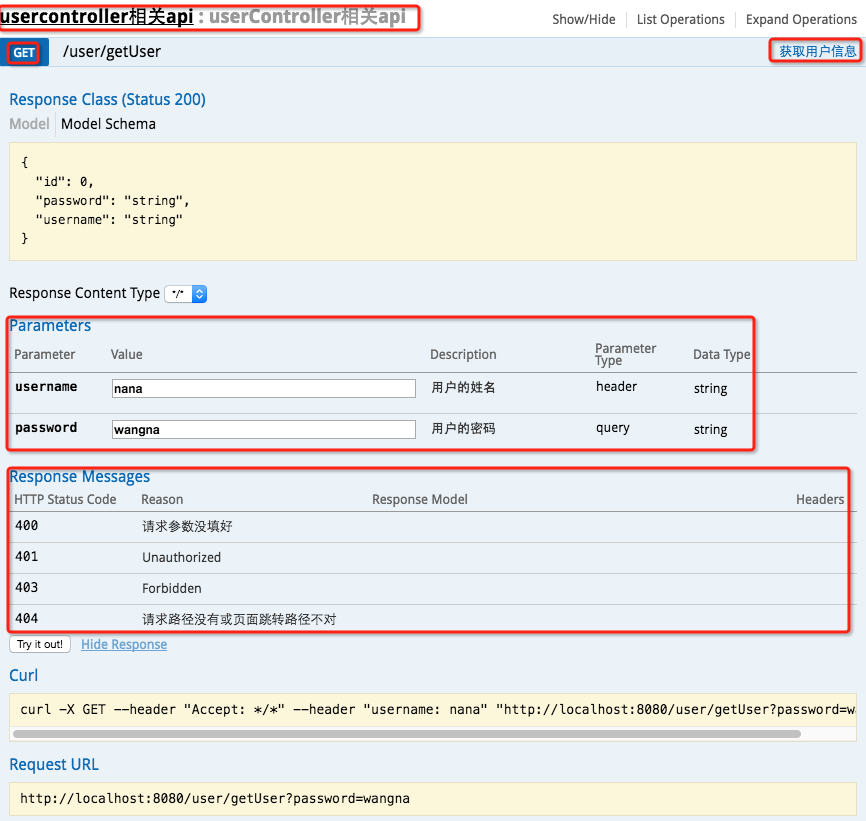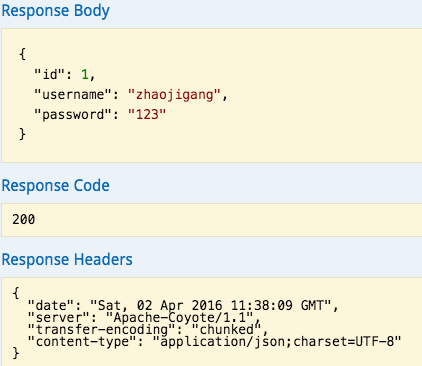【转载】springboot + swagger
注:本文参考自
http://www.jianshu.com/p/0465a2b837d2
https://www.cnblogs.com/java-zhao/p/5348113.html
swagger用于定义API文档。
好处:
- 前后端分离开发
- API文档非常明确
- 测试的时候不需要再使用URL输入浏览器的方式来访问Controller
- 传统的输入URL的测试方式对于post请求的传参比较麻烦(当然,可以使用postman这样的浏览器插件)
- spring-boot与swagger的集成简单的一逼
1、项目结构
和上一节一样,没有改变。
2、pom.xml
引入了两个jar。

<dependency>
<groupId>io.springfox</groupId>
<artifactId>springfox-swagger2</artifactId>
<version>2.2.2</version>
</dependency>
<dependency>
<groupId>io.springfox</groupId>
<artifactId>springfox-swagger-ui</artifactId>
<version>2.2.2</version>
</dependency>

3、Application.java

package com.xxx.firstboot; import org.springframework.boot.SpringApplication;
import org.springframework.boot.autoconfigure.SpringBootApplication; import springfox.documentation.swagger2.annotations.EnableSwagger2; @SpringBootApplication //same as @Configuration+@EnableAutoConfiguration+@ComponentScan
@EnableSwagger2 //启动swagger注解
public class Application { public static void main(String[] args) {
SpringApplication.run(Application.class, args);
} }

说明:
- 引入了一个注解@EnableSwagger2来启动swagger注解。(启动该注解使得用在controller中的swagger注解生效,覆盖的范围由@ComponentScan的配置来指定,这里默认指定为根路径"com.xxx.firstboot"下的所有controller)
4、UserController.java

package com.xxx.firstboot.web; import org.springframework.beans.factory.annotation.Autowired;
import org.springframework.web.bind.annotation.RequestHeader;
import org.springframework.web.bind.annotation.RequestMapping;
import org.springframework.web.bind.annotation.RequestMethod;
import org.springframework.web.bind.annotation.RequestParam;
import org.springframework.web.bind.annotation.RestController; import com.xxx.firstboot.domain.User;
import com.xxx.firstboot.service.UserService; import io.swagger.annotations.Api;
import io.swagger.annotations.ApiImplicitParam;
import io.swagger.annotations.ApiImplicitParams;
import io.swagger.annotations.ApiOperation;
import io.swagger.annotations.ApiResponse;
import io.swagger.annotations.ApiResponses; @RestController
@RequestMapping("/user")
@Api("userController相关api")
public class UserController { @Autowired
private UserService userService; // @Autowired
// private MyRedisTemplate myRedisTemplate; @ApiOperation("获取用户信息")
@ApiImplicitParams({
@ApiImplicitParam(paramType="header",name="username",dataType="String",required=true,value="用户的姓名",defaultValue="zhaojigang"),
@ApiImplicitParam(paramType="query",name="password",dataType="String",required=true,value="用户的密码",defaultValue="wangna")
})
@ApiResponses({
@ApiResponse(code=400,message="请求参数没填好"),
@ApiResponse(code=404,message="请求路径没有或页面跳转路径不对")
})
@RequestMapping(value="/getUser",method=RequestMethod.GET)
public User getUser(@RequestHeader("username") String username, @RequestParam("password") String password) {
return userService.getUser(username,password);
} // @RequestMapping("/testJedisCluster")
// public User testJedisCluster(@RequestParam("username") String username){
// String value = myRedisTemplate.get(MyConstants.USER_FORWARD_CACHE_PREFIX, username);
// if(StringUtils.isBlank(value)){
// myRedisTemplate.set(MyConstants.USER_FORWARD_CACHE_PREFIX, username, JSON.toJSONString(getUser()));
// return null;
// }
// return JSON.parseObject(value, User.class);
// } }

说明:
- @Api:用在类上,说明该类的作用
- @ApiOperation:用在方法上,说明方法的作用
- @ApiImplicitParams:用在方法上包含一组参数说明
- @ApiImplicitParam:用在@ApiImplicitParams注解中,指定一个请求参数的各个方面
- paramType:参数放在哪个地方
- header-->请求参数的获取:@RequestHeader
- query-->请求参数的获取:@RequestParam
- path(用于restful接口)-->请求参数的获取:@PathVariable
- body(不常用)
- form(不常用)
- name:参数名
- dataType:参数类型
- required:参数是否必须传
- value:参数的意思
- defaultValue:参数的默认值
- paramType:参数放在哪个地方
- @ApiResponses:用于表示一组响应
- @ApiResponse:用在@ApiResponses中,一般用于表达一个错误的响应信息
- code:数字,例如400
- message:信息,例如"请求参数没填好"
- response:抛出异常的类
- @ApiModel:描述一个Model的信息(这种一般用在post创建的时候,使用@RequestBody这样的场景,请求参数无法使用@ApiImplicitParam注解进行描述的时候)
- @ApiModelProperty:描述一个model的属性
以上这些就是最常用的几个注解了。
具体其他的注解,查看:
https://github.com/swagger-api/swagger-core/wiki/Annotations#apimodel
测试:
启动服务,浏览器输入"http://localhost:8080/swagger-ui.html"

最上边一个红框:@Api
GET红框:method=RequestMethod.GET
右边红框:@ApiOperation
parameter红框:@ApiImplicitParams系列注解
response messages红框:@ApiResponses系列注解
输入参数后,点击"try it out!",查看响应内容:

【转载】springboot + swagger的更多相关文章
- Swagger详解(SpringBoot+Swagger集成)(转)
版权声明:本文为博主原创文章,遵循 CC 4.0 BY-SA 版权协议,转载请附上原文出处链接和本声明.本文链接:https://blog.csdn.net/ai_miracle/article/de ...
- 【转】Swagger详解(SpringBoot+Swagger集成)
Swagger-API文档接口引擎Swagger是什么 Swagger是一个规范和完整的框架,用于生成.描述.调用和可视化 RESTful 风格的 Web 服务.总体目标是使客户端和文件系统作为服务器 ...
- SpringBoot+Swagger整合API
SpringBoot+Swagger整合API Swagger:整合规范的api,有界面的操作,测试 1.在pom.xml加入swagger依赖 <!--整合Swagger2配置类--> ...
- springboot+swagger集成
一.swagger介绍 Swagger 是一款RESTFUL接口的文档在线自动生成+功能测试功能软件.本文简单介绍了在项目中集成swagger的方法和一些常见问题.如果想深入分析项目源码,了解更多内容 ...
- springboot+swagger接口文档企业实践(下)
目录 1.引言 2. swagger接口过滤 2.1 按包过滤(package) 2.2 按类注解过滤 2.3 按方法注解过滤 2.4 按分组过滤 2.4.1 定义注解ApiVersion 2.4.2 ...
- springboot+swagger接口文档企业实践(上)
目录 1.引言 2.swagger简介 2.1 swagger 介绍 2.2 springfox.swagger与springboot 3. 使用springboot+swagger构建接口文档 3. ...
- 第四章 springboot + swagger(转载)
此篇博客转发自:http://www.cnblogs.com/java-zhao/p/5348113.html swagger用于定义API文档. 好处: 前后端分离开发 API文档非常明确 测试的时 ...
- springboot + swagger
swagger用于定义API文档. 好处: 前后端分离开发 API文档非常明确 测试的时候不需要再使用URL输入浏览器的方式来访问Controller 传统的输入URL的测试方式对于post请求的传参 ...
- 【第四章】 springboot + swagger
注:本文参考自 http://www.jianshu.com/p/0465a2b837d2 swagger用于定义API文档. 好处: 前后端分离开发 API文档非常明确 测试的时候不需要再使用URL ...
随机推荐
- Java编程的逻辑 (39) - 剖析LinkedList
本系列文章经补充和完善,已修订整理成书<Java编程的逻辑>,由机械工业出版社华章分社出版,于2018年1月上市热销,读者好评如潮!各大网店和书店有售,欢迎购买,京东自营链接:http:/ ...
- Java编程的逻辑 (31) - 剖析Arrays
本系列文章经补充和完善,已修订整理成书<Java编程的逻辑>,由机械工业出版社华章分社出版,于2018年1月上市热销,读者好评如潮!各大网店和书店有售,欢迎购买,京东自营链接:http: ...
- 编写.info文件
概述 drupal用.info文件来存储主题和模块的metadata. 对于模块来说,.info文件用于: 为Drupal站点管理界面解析信息: 为模块的激活和卸载提供标准和需求: 提醒drupal一 ...
- mongo 杀掉慢的程序killMyRunningOps("12.23.32.21") #####这个是客户端的ip
mongodb运维(3) db.currentOp与db.killOp命令 2018.08.12 23:55 113浏览 字号 好久没更新mongo运维这块知识了,这次介绍 db.currentOp ...
- Python中sorted()方法的用法
Python中sorted()方法的用法 2012-12-24 22:01:14| 分类: Python |字号 订阅 1.先说一下iterable,中文意思是迭代器. Python的帮助文档中对i ...
- 【转】]监听SMS消息/编程实现短信拦截
当设备接收到一条新的SMS消息时,就会广播一个包含了android.provider.Telephony.SMS_RECEIVED动作的Intent.注意,这个动作是一个字符串值,SDK 1.0不再包 ...
- Axiom3D:Ogre动画基本流程与骨骼动画
在Axiom中,Animation类用于管理动画,在此对象中主要管理着AnimationTrack对象,此对象用于管理动画的各种类型的每一桢.在Axiom中,动画类型主要有变形动画,姿态动画,骨骼动画 ...
- 使用Selenium来抓取动态加载的页面
原文:http://my.oschina.net/flashsword/blog/147334?p=1 一般的爬虫都是直接使用http协议,下载指定url的html内容,并对内容进行分析和抽取.在我写 ...
- C# 使用XPath解析网页
1.需要安装库HtmlAgilityPack ,官网http://htmlagilitypack.codeplex.com/ // From File var doc = new HtmlDocume ...
- Spring JDBC SqlQuery类示例
org.springframework.jdbc.object.SqlQuery类提供了表示SQL查询的可重用操作对象. 使用到的 Student 表的结构如下 - CREATE TABLE Stud ...
